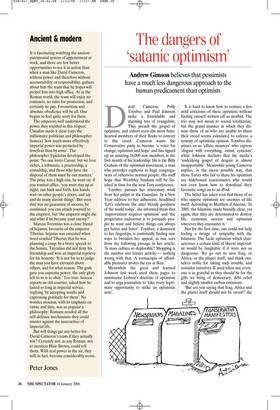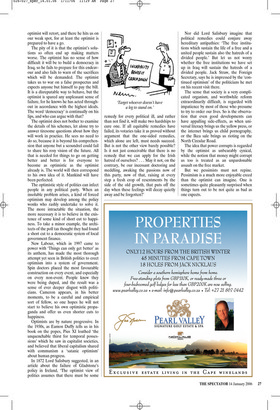The dangers of ‘satanic optimism’
Andrew Gimson believes that pessimists have a much less dangerous approach to the human predicament than optimists David Cameron, Polly Toynbee and Paul Johnson make a formidable and alarming trio of evangelists. They preach the gospel of optimism, and exhort even the most fainthearted members of their flocks to convert to this creed. Cameron wants the Conservative party to become ‘a voice for change, optimism and hope’ and has signed up an amazing 16,000 new members in the first month of his leadership. He is the Billy Graham of the optimism movement, a man who provokes euphoria in huge congregations of otherwise normal people. His staff hope that Wembley Stadium will be finished in time for the next Tory conference.
Toynbee pursues her missionary work from her pulpit in the Guardian. In a New Year address to her adherents, headlined ‘Let’s celebrate the utter bloody goodness of the world today’, she informed them that ‘improvement requires optimism’ and ‘the progressive endeavour is to persuade people to want and believe things can always get better and fairer’. Toynbee, a democrat to her fingertips, is continually finding new ways to broaden her appeal, as one sees from the following passage in her article: ‘Is mass culture so deplorable? Shopping is the number one leisure activity — nothing wrong with that. A cornucopia of affordable pleasures invites the eye at Ikea.’ Meanwhile the great and learned Johnson last week used these pages to summarise Leibniz’s doctrine of optimism and to urge journalists to ‘take every legitimate opportunity to strike an optimistic note’. It is hard to know how to venture a few mild criticisms of these optimists without finding oneself written off as morbid. The trio may not mean to sound totalitarian, but the grand manner in which they dismiss those of us who are unable to share their creed seems calculated to enforce a tyranny of optimistic opinion. Toynbee dismisses us as ‘effete moaners’ who express ‘disgust with everything, ennui, cynicism’ while Johnson declares that the media’s ‘underlying gospel of despair is almost insupportable’. Meanwhile young Cameron implies, in the nicest possible way, that those Tories who fail to share his optimism are hidebound reactionaries who would not even know how to download their favourite songs on to an iPod.
The belief has taken root that those of us who oppose optimism are enemies of life itself. According to Matthew d’Ancona, ‘In 2005, the Islamists made brutally clear, yet again, that they are determined to destroy life, economic success and optimism wherever they encounter it.’ Not for the first time, one could not help feeling a twinge of sympathy with the Islamists. The facile optimism which characterises a certain kind of liberal imperialist would be laughable if it were not so dangerous. We go out to save Iraq, or Africa, or the planet itself, and think ourselves noble for taking such trouble, and consider ourselves ill used when not everyone is as grateful as they should be for the gifts we bring of democracy, debt relief and slightly smaller carbon emissions.
‘But are you saying that Iraq, Africa and the planet itself should not be saved?’ the optimist will retort, and there he hits us on our weak spot, for at least the optimist is prepared to have a go.
The pity of it is that the optimist’s solutions so often end up making matters worse. The optimist has no sense of how difficult it will be to build a democracy in Iraq, so he fails to prepare for this endeavour and also fails to warn of the sacrifices which will be demanded. The optimist takes us to war on a false prospectus and expects anyone but himself to pay the bill. It is a disreputable way to behave, but the optimist is spared any unpleasant sense of failure, for he knows he has acted throughout in accordance with the highest ideals. The word ‘democracy’ is continually on his lips, and who can argue with that?
The optimist does not bother to examine the details of his schemes, let alone try to answer tiresome questions about how they will work in practice. He sees no need to do so, because it is beyond his comprehension that anyone but a scoundrel could fail to share his rosy vision of the future. All that is needed for things to go on getting better and better is for everyone to become as optimistic as the optimist already is. The world will then correspond to his own idea of it. Mankind will have been perfected.
The optimistic style of politics can infect people in any political party. When an insoluble problem arises, a kind of forced optimism may develop among the policy wonks who rashly undertake to solve it. The more intractable the situation, the more necessary it is to believe in the existence of some kind of short cut to happiness. To take a minor example, the architects of the poll tax thought they had found a short cut to a democratic system of local government finance.
New Labour, which in 1997 came to power with ‘Things can only get better’ as its anthem, has made the most thorough attempt yet seen in British politics to erect optimism into a system of government. Spin doctors placed the most favourable construction on every event, and especially on every non-event. People knew they were being duped, and the result was a sense of ever deeper disgust with politicians. Cameron appears, in his better moments, to be a careful and empirical sort of fellow, so one hopes he will not start to believe his own optimistic propaganda and offer us even shorter cuts to happiness.
Optimists are by nature progressive. In the 1930s, as Eamon Duffy tells us in his book on the popes, Pius XI loathed ‘the unquenchable thirst for temporal possessions’ which he saw in capitalist societies, and believed that liberal capitalism shared with communism a ‘satanic optimism’ about human progress.
In 1872 Lord Salisbury suggested, in an article about the failure of Gladstone’s policy in Ireland, ‘The optimist view of politics assumes that there must be some remedy for every political ill, and rather than not find it, will make two hardships to cure one. If all equitable remedies have failed, its votaries take it as proved without argument that the one-sided remedies, which alone are left, must needs succeed. But is not the other view barely possible? Is it not just conceivable that there is no remedy that we can apply for the Irish hatred of ourselves? ... May it not, on the contrary, be our incessant doctoring and meddling, awaking the passions now of this party, now of that, raising at every step a fresh crop of resentments by the side of the old growth, that puts off the day when these feelings will decay quietly away and be forgotten?’ Nor did Lord Salisbury imagine that political remedies could conjure away hereditary antipathies: ‘The free institutions which sustain the life of a free and a united people sustain also the hatreds of a divided people.’ But let us not worry whether the free institutions we have set up in Iraq will sustain the hatreds of a divided people. Jack Straw, the Foreign Secretary, says he is impressed by the ‘continued optimism’ of the politicians he met on his recent visit there.
The sense that society is a very complicated organism, and worthwhile reform extraordinarily difficult, is regarded with impatience by most of those who presume to try to order our lives. So is the observation that even good developments can have appalling side-effects, as when universal literacy brings us the yellow press, or the internet brings us child pornography, or the Ikea sale brings us rioting on the North Circular Road.
The idea that power corrupts is regarded by the optimist as unbearably cynical, while the notion that money might corrupt us too is treated as an unpardonable assault on the free market.
But we pessimists must not repine. Pessimism is a much more enjoyable creed than the optimist can imagine. One is sometimes quite pleasantly surprised when things turn out to be not quite as bad as one expects.















































 Previous page
Previous page